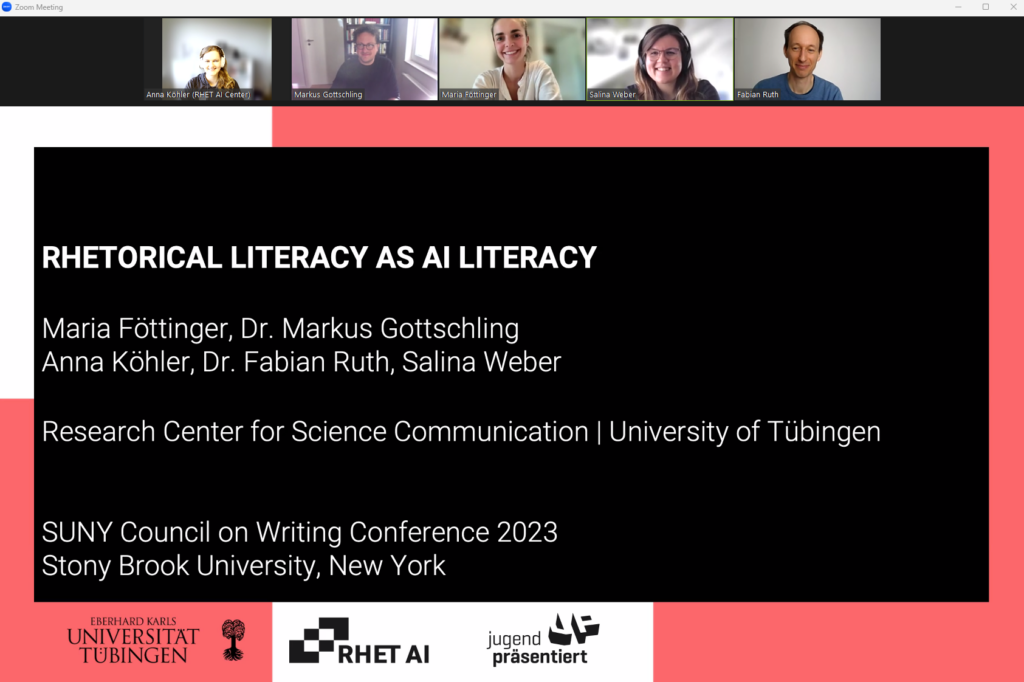Together with our colleagues Maria Föttinger and Fabian Ruth from Jugend Präsentiert (Youth Presents) we will be hosting a panel on "Rhetorical Literacy as AI Literacy" at the SUNY Council on Writing Conference 2023 in New York / Zoom.
Main topics of the conference include ethics of persuasion by and with AI, existing and emerging AI developments and platforms likely to influence writing and rhetoric in the future, dominant discourses and rhetorics of AI and more. A focus during the conference will be on the connection between rhetoric and artificial intelligence.
Ahead of the conference the team presenting the panel (consisting of Markus Gottschling, Salina Weber, and Anna Köhler from the RHET AI Center and Maria Föttinger and Fabian Ruth from Youth Presents) met virtually on october 13th to practice their presentations and clear up the last organizational questions. The main presentation will be held at 10:30 AM EDT (4:30 PM MESZ).

The conference will take place on October 13th & 14th, 2023 at Stony Brook University in New York and being hosted online via Zoom.
Additional information for SUNY Council on Writing Conference 2023
AI literacy, which refers to "a set of skills that enable a solid understanding" (Casal-Otero et al. 2023) of the technology, is deemed a crucial competence for both current and future learners (e.g. Long & Magerko 2020). Especially in the realm of knowledge work, practical knowledge about and the influence of generative AI appear particularly pertinent (Chui et al. 2023). However, the relationship between generative AI and knowledge is complicated due to the contentious semantic status of AI-generated texts (Bender et al. 2021). Apart from copyright issues and biases in training data, texts and images produced by generative AI lack concern for accuracy and can thus be characterized as “bullshit" (Frankfurt 2005). Consequently, attaining AI literacy should involve comprehending the implications that generative AI functions as an almost inexhaustible mechanism for producing text and images, possibly without intentionality, moral, ethical, or factual control.
Rhetoric presents a promising strategy to address these challenges. The rhetorical production of texts, arguments, and topoi inherently possesses a machine-like quality (Brown Jr. 2014), bearing substantial similarity to the mode of production of generative AI. At the same time, as a consequence of historical criticism dating back to Plato, rhetoric as an educational discipline has fostered stringent guidelines to counter allegations of arbitrariness in its methodologies. Utilizing rhetoric as pedagogy can enrich understanding of generative AI, facilitating more effective integration into educational contexts. This necessitates educational restructuring, entailing redefined teacher roles, specified and refined student skills, and potentially the incorporation of AI tutors as assistants.
The panel, therefore, aims to explore why knowledge about AI should encompass not only technical aspects but also how rhetorical literacy can contribute to and enhance the concept of AI literacy in learning environments. Speaker one's contribution establishes a connection between AI literacy and rhetorical literacy, and by employing rhetorical concepts such as imitatio auctorum and doxa, illustrates why perceiving generative AI as a rhetorical system can be beneficial from a learning standpoint. With this rhetorical framework in mind, we will delve into the instructional implications of generative AI concerning the acquisition of presentation competence. Speakers 2 and 3 both examine the relationship between generative AI and the rhetorical format of presentations by secondary school students in STEM subjects. Speaker 2's focus will be on the role of the teacher as a rhetorically trained guide, while speaker 3 will discuss the meaning of rhetorical control over generative AI tools from a student's perspective, emphasizing rhetorical prompting and reflective analysis. To conclude the panel, speaker 4 offers reflections on AI functioning as an independent rhetorical tutor and its implications for ethos construction in simulated communication scenarios, using ChatGPT as an illustration.
Dr. Markus Gottschling: “Transformer Rhetoric: Using rhetorical principles to understand generative AI”
Center for Rhetorical Science Communication Research on Artificial Intelligence (University of Tübingen, Germany)
markus.gottschling@uni-tuebingen.de
Maria Föttinger: “Cybernetic Instruction, Constructivism and Generative AI in Concert — The Teacher as Rhetorical Helmsman for Developing Presentation Competence in Secondary School Students with Generative AI Tools”
maria.foettinger@uni-tuebingen.de
Presentation Research Unit at the Research Center for Science Communication (University of Tuebingen, Germany)
Dr. Fabian Ruth: “Do generative AI tools change the presentation preparation of secondary school students? Instructional implications for the competent use of generative AI for successful presentations.“
fabian.ruth@uni-tuebingen.de
Presentation Research Unit at the Research Center for Science Communication (University of Tuebingen, Germany)
Anna-Marie Köhler & Salina Weber: “ChatGPT as an ideal tutor? A question of ethos”.
anna-marie.koehler@uni-tuebingen.de, salina.weber@uni-tuebingen.de
Center for Rhetorical Science Communication Research on Artificial Intelligence (University of Tübingen, Germany)





